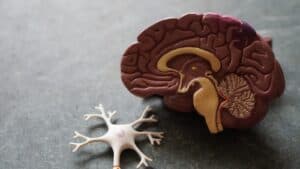Chocolate and serotonin share a fascinating connection that goes beyond just satisfying a sweet tooth. Known as the “feel-good” neurotransmitter, serotonin plays a vital role in regulating mood, appetite, and even memory. Interestingly, chocolate contains tryptophan, a key building block for serotonin production, which can help boost those happy feelings we all crave.
Dark chocolate, especially with higher cocoa content, stands out as a rich source of serotonin and its precursor, tryptophan. Studies show that chocolate with 85% cocoa contains the most serotonin, making it a potential mood enhancer. While the serotonin levels in chocolate are small, the combination of its compounds and sugars helps the brain absorb and convert tryptophan more effectively.
Understanding Serotonin
Serotonin, known chemically as 5-hydroxytryptamine (5-HT), is a neurotransmitter that carries messages between neurons in the brain and throughout the body. It’s closely related to mood regulation, mental well-being, and various aspects of physical functions.
Role of Serotonin in the Brain
Serotonin influences brain activity by regulating emotions, appetite, memory, and sleep. It’s deeply involved in creating positive feelings and can contribute to a sense of happiness or mental balance. A healthy serotonin level supports brain function, while low levels are often linked to depression, anxiety, and other mental health issues. It’s also responsible for moderating stress responses, enhancing mood stability, and controlling impulses.

This neurotransmitter actively influences the hypothalamus, which governs essential bodily functions like appetite and metabolism. For instance, food cravings, such as craving chocolate, may sometimes be tied to fluctuating serotonin levels. Proper serotonin function ensures better brain health and supports a more stable mental state.
Foods That Influence Serotonin Levels
Diet plays a key role in maintaining healthy serotonin levels. Foods high in tryptophan—a precursor to serotonin—help the body produce more serotonin. Protein-rich options like poultry, eggs, and fish serve as excellent sources. Other beneficial foods include nuts, seeds, and dairy products.

Dark chocolate, particularly varieties with 70-85% cocoa content, stands out as a food that promotes serotonin. It provides tryptophan and other compounds like theobromine and caffeine, which impact mood positively. For example, chocolate with 85% cocoa contains 29 micrograms of serotonin per gram and 133 micrograms of tryptophan per gram. Eating chocolate can offer mental health benefits by promoting relaxation and enhancing your mood.
High-fiber foods like whole grains and vegetables improve serotonin indirectly through the digestive system, fostering a well-functioning gut. This connection between gut health and serotonin underscores the importance of a balanced diet for overall well-being.
The Chemistry of Chocolate
Chocolate contains a unique combination of compounds that influence brain activity, mood, and overall well-being. These chemical properties contribute to its widespread appeal and association with positive feelings.
Key Components in Chocolate
Chocolate’s chemistry begins with its primary ingredient, cocoa, which comes from the seeds of Theobroma cacao. The main active compounds in cocoa include flavanols, theobromine, and caffeine. Flavanols are powerful antioxidants that improve blood flow and support healthy brain function. For example, they can enhance blood flow to the brain, impacting memory and cognition. Theobromine creates a mild stimulatory effect, contributing to the comforting feeling of eating chocolate, while caffeine boosts alertness.
Dark chocolate contains a higher percentage of cocoa and, therefore, more of these beneficial compounds. It also has small amounts of serotonin and tryptophan, a protein building block responsible for serotonin production in the brain. Although direct serotonin content in chocolate is minimal, its sugars enhance tryptophan absorption, indirectly leading to more serotonin production and an uplifted mood. This makes dark chocolate a notable comfort food that supports mental health and brain health when consumed in moderation.
Interactions With Brain Functions
Chocolate interacts with brain activity by triggering the release of neurotransmitters like dopamine, serotonin, and endorphins. Dopamine stimulates the brain’s reward system, leading to feelings of pleasure and motivation, while serotonin promotes relaxation and reduces anxiety. Eating chocolate, especially varieties rich in cocoa, activates endorphins, which are chemicals that relieve stress and contribute to happiness.
The chemistry of chocolate goes further. Flavanols influence neurons and brain metabolism, improving cognitive health and potentially preventing mental health issues like depression. They accumulate in regions like the hypothalamus and hippocampus, which are responsible for regulating emotions, memory, and appetite. Additionally, the improved blood flow from flavanols and theobromine aids brain function by delivering oxygen and nutrients necessary for optimal performance.
By understanding the interplay of these components, it’s clear why chocolate is closely related to positive feelings and why it remains a food so deeply tied to happiness and mental well-being.
Chocolate and Serotonin
The connection between chocolate and serotonin reveals how this beloved treat influences brain activity, mood, and overall well-being. Its unique compounds, particularly in dark chocolate, are closely related to serotonin production and positive feelings.
How Chocolate Affects Serotonin Levels
Chocolate contributes to serotonin levels through its content of tryptophan, an amino acid essential for producing serotonin in the brain. Dark chocolate, with over 60% cocoa content, offers the highest serotonin potential. It has been reported to contain up to 145 μg/g of serotonin. Although serotonin levels in chocolate are minimal, its sugar aids in tryptophan absorption, supporting the transformation into serotonin once in the central nervous system.

Many studies show that serotonin production in neurons significantly impacts mental health by regulating mood, appetite, and memory. Chocolate’s flavanols, caffeine, and theobromine also complement serotonin’s mood-enhancing effects, making it an effective comfort food in moderation.
Psychological and Mood Benefits
Eating chocolate promotes feelings of happiness by triggering the brain’s reward system. Serotonin, dopamine, and endorphins are released, improving mood and reducing stress. Dark chocolate particularly excels in this due to its higher concentrations of beneficial compounds, creating powerful mental health benefits like reduced symptoms of depression and anxiety.
Cocoa flavanols accumulate in areas of the brain responsible for regulating emotions, such as the hypothalamus, further enhancing emotional stability. Psychological responses to chocolate’s sweetness, texture, and taste amplify the sense of pleasure, contributing to immediate mood improvement.
Potential Health Considerations
Despite its serotonin-boosting properties, excessive chocolate consumption can lead to weight gain due to its sugar and calorie content. Maintaining moderation ensures its health benefits while limiting potential risks. Choosing high-cocoa dark chocolate over milk chocolate is beneficial for brain health, as it contains less sugar and more flavanols.
While dark chocolate supports blood flow, brain function, and reduced inflammation, excess sugar may counteract its health benefits for the digestive system and metabolism. A balanced diet ensures that serotonin production remains regulated without compromising overall physical health.
Chocolate’s relationship with serotonin is both fascinating and complex. While it’s not a magic solution for boosting serotonin, its unique combination of compounds, especially in dark chocolate, offers notable benefits for mood and mental well-being. By promoting the absorption of tryptophan and triggering feel-good neurotransmitters, chocolate can be a delightful addition to a balanced diet.
Moderation is key when indulging in chocolate, as its sugar and calorie content can outweigh the benefits if overconsumed. Opting for high-cocoa dark chocolate ensures you’re maximizing its positive effects while minimizing potential downsides. A mindful approach to chocolate consumption can support your mental health and bring moments of happiness to your day.
Frequently Asked Questions
How does chocolate affect serotonin levels?
Chocolate contains tryptophan, an amino acid that helps produce serotonin, a neurotransmitter linked to mood regulation. The sugars in chocolate also enhance tryptophan absorption, promoting serotonin production and uplifting mood.
Does chocolate really improve mood?
Yes, chocolate can improve mood. Its compounds, such as tryptophan, flavanols, and theobromine, promote serotonin and dopamine release, contributing to feelings of relaxation and happiness.
Which type of chocolate is best for mental health?
Dark chocolate with 70-85% cocoa content is best for mental health. It contains more flavanols and less sugar, supporting serotonin production and enhancing cognitive function.
Can eating chocolate help with depression?
Dark chocolate consumption in moderation is associated with lower depressive symptoms. Its mood-boosting compounds can help improve mental well-being, but it is not a substitute for medical treatment.
Why is dark chocolate healthier than milk chocolate?
Dark chocolate has higher cocoa content and contains more flavanols, antioxidants, and tryptophan. It also has less sugar, making it better for brain function and mental health.
What other foods increase serotonin naturally?
Foods like poultry, eggs, fish, nuts, seeds, and bananas are rich in tryptophan, an essential amino acid for serotonin production.
How does chocolate benefit cognitive function?
Flavanols in chocolate improve blood flow to the brain, support cognitive health, and may enhance memory and concentration over time.
Is it possible to eat too much chocolate?
Yes, excessive chocolate consumption can lead to weight gain, high sugar intake, and potential health issues. Moderation is key to enjoying its benefits healthily.
Can chocolate improve sleep?
While chocolate contains small amounts of caffeine, its magnesium and serotonin-promoting effects may help relax the body and support better sleep when consumed in moderation.
How does gut health impact serotonin levels?
About 90% of serotonin is produced in the gut. A diet rich in fiber and probiotics supports gut health, indirectly boosting serotonin levels and overall mood.
Chocolate’s ability to boost serotonin levels makes it a delightful way to enhance your happiness. This beloved treat not only satisfies your taste buds but also supports your mental well-being by promoting feelings of joy and relaxation. To complement this sweet serotonin boost, try spending more quality time with loved ones, listening with compassion, and adopting positive habits for daily joy. Cultivating positive mental health habits and expressing gratitude in relationships can further amplify your overall happiness. So, the next time you indulge in chocolate, know that you’re not just treating your taste buds—you’re also giving your happiness a little boost!

